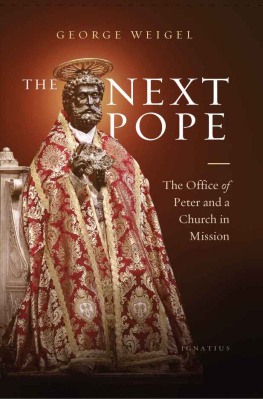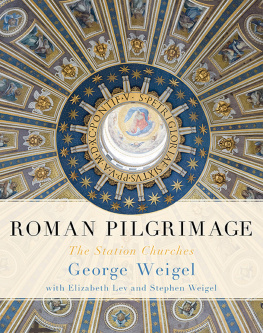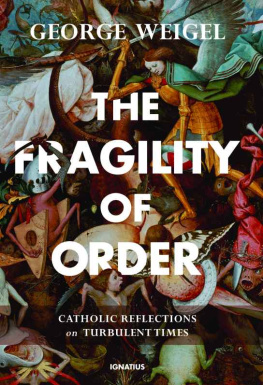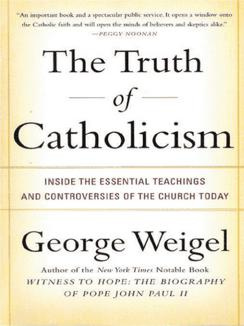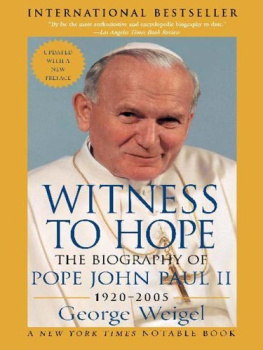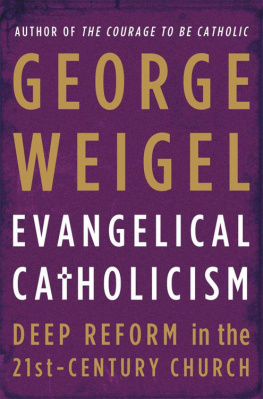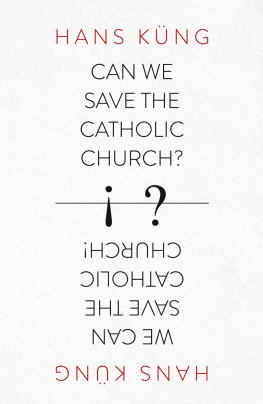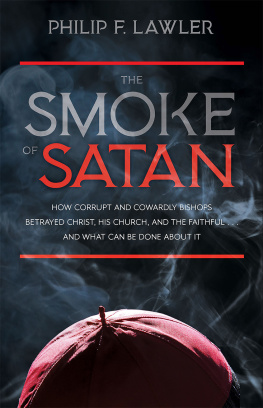ACCLAIM FOR The Courage to Be Catholic
One of the most lively, learned, and articulate intellectuals on the American scene, Weigel speaks to an audience that transcends the... confines of Catholic theology.
DANIEL JOHNSON, Commentary
The best book to come out on the scandals... [Weigel] not only offers a sophisticated treatment of the issues but also has some incisive suggestions for where the Church needs to go from here.
KATHRYN JEAN LOPEZ, American Outlook
All genuine reform must be grounded in re-conversion to Christ, and Weigels call to deeper holiness is passionate, and has nothing of the saccharine or the sentimental. He offers a heroic vision of the Christian life that is much needed in a time of despair and mediocrity.
CHRISTOPHER J RUDDY, The Christian Century
A valuable book... because it represents a new voice in the Catholic Church, the emergence of a new breed of young intellectual conservatives, determinedly Catholic in the traditional sense, absolutely loyal to the vision of Church and priesthood articulated during the pontificate of John Paul.
BRENDAN HOBAN, The Furrow
Riveting. Disagree with him if you will. I question some points myself. But boring the man is not.
JOHN JAY HUGHES, The National Catholic Reporter
The principal strength of Weigels analysis is that he always looks at the Church through a theological lens which, though it may surprise many lay Catholics, is not always what bishops have done.
FATHER RAYMOND J. DE SOUZA, National Post
Weigel, whose biography of John Paul II is justly admired, has absorbed the teaching and example of the present Holy Father both as to what the Church is and what the place and life of the clergy within it ought to be. In fact, this is, in the end, a surprisingly positive book.
JAMES V. SCHALL, S.J. , Claremont Review of Books
ALSO BY GEORGE WEIGEL
Tranquillitas Ordinis: The Present Failure and Future Promise
of American Catholic Thought on War and Peace
Catholicism and the Renewal of American Democracy
American Interests, American Purpose:
Moral Reasoning and U.S. Foreign Policy
Freedom and Its Discontents: Catholicism Confronts Modernity
Just War and the Gulf War (with James Turner Johnson)
The Final Revolution: The Resistance Church and
the Collapse of Communism
Idealism Without Illusions: U.S. Foreign Policy in the 1990s
Soul of the World: Notes on the Future of Public Catholicism
Witness to Hope: The Biography of Pope John Paul II
The Truth of Catholicism
THE
COURAGE
TO BE
CATHOLIC
Crisis, Reform, and
the Future of the Church
George Weigel
A MEMBER OF THE PERSEUS BOOKS GROUP
NEW YORK
Copyright 2002 by George Weigel
Hardback edition first published in 2002 by Basic Books,
A Member of the Perseus Books Group
Paperback edition first published in 2004 by Basic Books
All rights reser ved. Printed in the United States of America. No part of this book may be reproduced in any manner whatsoever without written permission except in the case of brief quotations embodied in critical articles and reviews. For information, address Basic Books, 387 Park Avenue South, New York, NY 10016.
Books published by Basic Books are available at special discounts for bulk purchases in the United States by cor porations, institutions, and other or ganizations. For more information, please contact the Special Markets Department at the Perseus Books Group, 11 Cambridge Center, Cambridge MA 02142, or call (617) 252-5298, (800) 255-1514 or e-mail .
Designed by Brian Mulligan
Cataloging-in-Publication Data is available at the Library of Congress.
ISBN-10: 0-465-09260-8 (hc)
ISBN-13: 978-0-465-09260-4 (hc)
ISBN 0-465-09261-6 (pbk)
ISBN-13: 978-0-465-09261-1 (pbk)
eBook ISBN: 9780465009947
DHSB 05 06 07 / 10 9 8 7 6 5 4
For all those who will contribute to the
genuinely Catholic reform of the
Church in the United States.
You know who you are.
Be not afraid.
INTRODUCTION
I N THE FIRST MONTHS OF 2002, the Catholic Church in the United States entered the greatest crisis in its history. When Lent began on February 13, the penitential ashes imposed that day on millions of Catholics felt leaden. Something had gone desperately wrong. Something was broken. Something had to be fixed.
Like every Christian community, the Catholic Church is a Church of sinners. Its spiritual rhythms regularly repeat the ancient biblical cycle of failure, repentance, penance, forgiveness, and reconciliation. Yet even in a Church that knows a lot about sin, some acts of wickedness still retain their capacity to shock. The sexual abuse of minors by priestsmen traditionally called Fatheris one such kind of wickedness. So is the failure of bishopsshepherds, in the ancient imageto guard the flock against predators, especially predators from within the household of faith. The shock of seemingly widespread clerical sexual misconduct, reported on an almost daily basis in the first months of 2002, was immeasurably intensified by what even sympathetic Catholics had to regard as some bishops inept and irresponsible response to grave sins and crimes. In this instance, one plus one yielded something more than two: one plus one equaled an unprecedented crisis.
In the language and thought-world of the Bible, crisis has two meanings. The first is the familiar sense of the word: the venerable Websters Seventh Collegiate Dictionary defines a crisis as the turning point for better or worse in an acute disease or fever... a paroxysmal attack of pain, distress, or disordered functions... an emotionally significant event or radical change of status in a persons life. Throughout the first half of 2002, the Catholic Church in the United States certainly seemed to be in crisis, according to those definitions. The second meaning of crisis in the Biblical world is instructive, however: a crisis is also a great time of opportunity, an invitation to deeper faith, a summons to a more thorough conversion.
The premise of this small book is that we best understand the current crisis in Catholic life in this second senseas a tremendous opportunity. An opportunity for what? An opportunity to deepen the reforms of the Catholic Church begun by the Second Vatican Council in 19621965, which are precisely the reforms urged by Pope John Paul II throughout his entire pontificate.
Like virtually everything else in Catholic life, the very word reform has been bitterly contested since Vatican II. Those usually identified as Catholic reformers would, in at least some instances, be more accurately described as a wrecking crew for whom nothing short of Catholicisms transformation into a kind of high-church, politically correct American denominationCatholic Litewill suffice. At the other end of the spectrum, Catholics of a more traditional bent have shied away from the word reform and its powerful connotations of the Protestant Reformation, preferring a word like renewal to describe what they think Vatican II intended and John Paul II intends. In light of the two-edged scandal of clerical sexual abuse and episcopal malfeasance, perhaps everyone in the Catholic Churchincluding that broad group of faithful Catholics for whom the ecclesiastical tong-wars are of far less interest than the sacraments and the local parishcan now agree that what the Church needs is reform.
What, then, is genuinely Catholic


